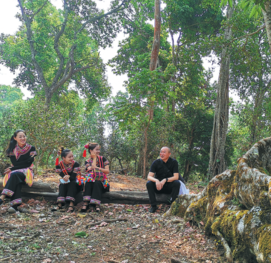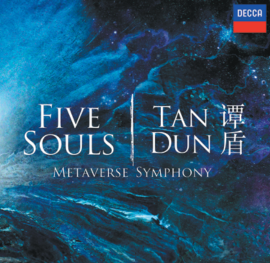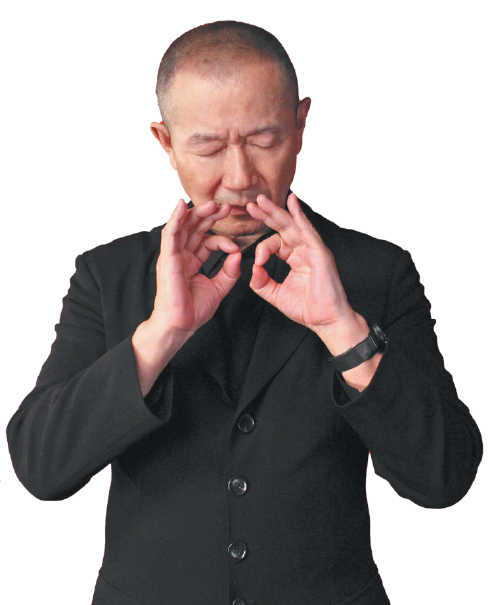Philosophical soul music
Composer combines ancient wisdom with metaverse to explore different sounds, Chen Nan reports.
On March 3, award-winning composer Tan Dun's latest music work, Five Souls, was released. With five movements written for a small ensemble, featuring water percussion, harp, brass, strings and didgeridoo, the music work offers listeners a glimpse of the composer's interpretation of the metaverse.
"The term 'metaverse' is the latest buzzword, which has an impact on our daily lives. As a composer, I'm also aware of the leading trend, which makes me think," says Tan, based in New York, during an interview via Zoom.
Heavily influenced and inspired by ancient Taoist philosophers such as Laozi and Zhuangzi, who also provided understanding of the universe, especially ideas about people living in harmony with nature, the composer created the new work to display his own theory "from the universe to metaverse" through the exploration of different sounds.
Tan calls the work a "metaverse symphony", and the five movements in it are: H2O Tempo, Horch, WE (West and East), Meta Voyage and Dream Rhythm.
The music work was released by Decca Classics, a classical music label under Universal Music Group, after the composer announced a recording partnership with the label on Feb 9.
The recording of Five Souls took place in an old factory in New York with musicians playing in a circle. Supported by immersive audio technology, the recording captured an auditory atmosphere, which is encompassing.
Tan, who was the conductor during the recording, says the old factory was painted with two colors: one half was black and the other half white. He stood on the line that separated the two spaces.
"With black and white, the space brought us the energy of yin and yang. There were also lights, shadows and thin smoke, which was like a universe that we created," Tan says. "I always consider composers as visual artists who create with different colors, and different objects and musical instruments. I can also paint because those different sounds are just like colors."
As a trained classical musician, he is always ahead of the curve. Tan graduated from the Central Conservatory of Music in Beijing and later Columbia University in New York. He has created music from symphonies to operas. He is known for the fusion of Eastern and Western musical styles.
Tan's music works have won him worldwide acclaim. Many people know the composer from his soundtrack in film director Ang Lee's Crouching Tiger, Hidden Dragon, for which Tan won an Academy Award for best score in 2001. He has scored music for global events such as the 2008 Beijing Olympics. He is the first composer commissioned by Google and YouTube to write the Internet Symphony No 1.
In January, Tan conducted the UK premiere of his epic work, Buddha Passion, at the Royal Festival Hall in London. The monumental work, which is a result of the composer's multiple trips to Dunhuang, Northwest China's Gansu province, to study and document the Mogao Caves, involves choirs, a large orchestra, six percussionists and an array of soloists, including indigenous singers, traditional Chinese instrumentalists, such as a pipa player. The recording of Buddha Passion will be released by Decca Classics on April 7.
The world premiere of a recording of Tan's The Tears of Nature will follow in September. Also a release by Decca Classics, the 25-minute percussion concerto was written after three major natural disasters: the Wenchuan earthquake in Southwest China's Sichuan province in 2008, the tsunami in Japan in 2011 and Hurricane Sandy, which caused significant damage in the United States in 2012, all of which personally affected Tan.
The Tears of Nature displays the composer's reflection on the relationship between human beings and nature. Emotions like sadness, warmth and compassion are on the album.
"I was born and grew up in a small village in Hunan province. I was a barefoot, wild child running around. Nature is close to me and I always respect and admire its power," says Tan, who is keen on making music with nature, from water to paper, stone, and metal.
"As a child, my grandparents told me stories about nature, which made me believe that all the things in the world, such as stones, flowers and land, are living creatures like us."
He says his grandparents once told him that when it rains, the sky is crying.
"When I travel by plane, I love watching the sky from the window. The colors of the sky also amaze me, with the moving clouds and changing daylight. Nature is the best artist," he says.
The Norddeutscher Rundfunk (NDR) Sinfonieorchester and Martin Grubinger, a percussionist from Austria, presented the official world premiere performance of The Tears of Nature on Dec 13, 2012, in Lubeck, Germany, with Tan conducting. In 2015, Grubinger performed the same piece with the Shanghai Symphony Orchestra under the baton of Tan in Shanghai.
"I have two goals in my heart. I not only want to establish a musical idea but also want to develop a cross-cultural idea that brings nature and classical music, the ancient and modern, together," Tan adds.
Contact the writer at chennan@chinadaily.com.cn



















